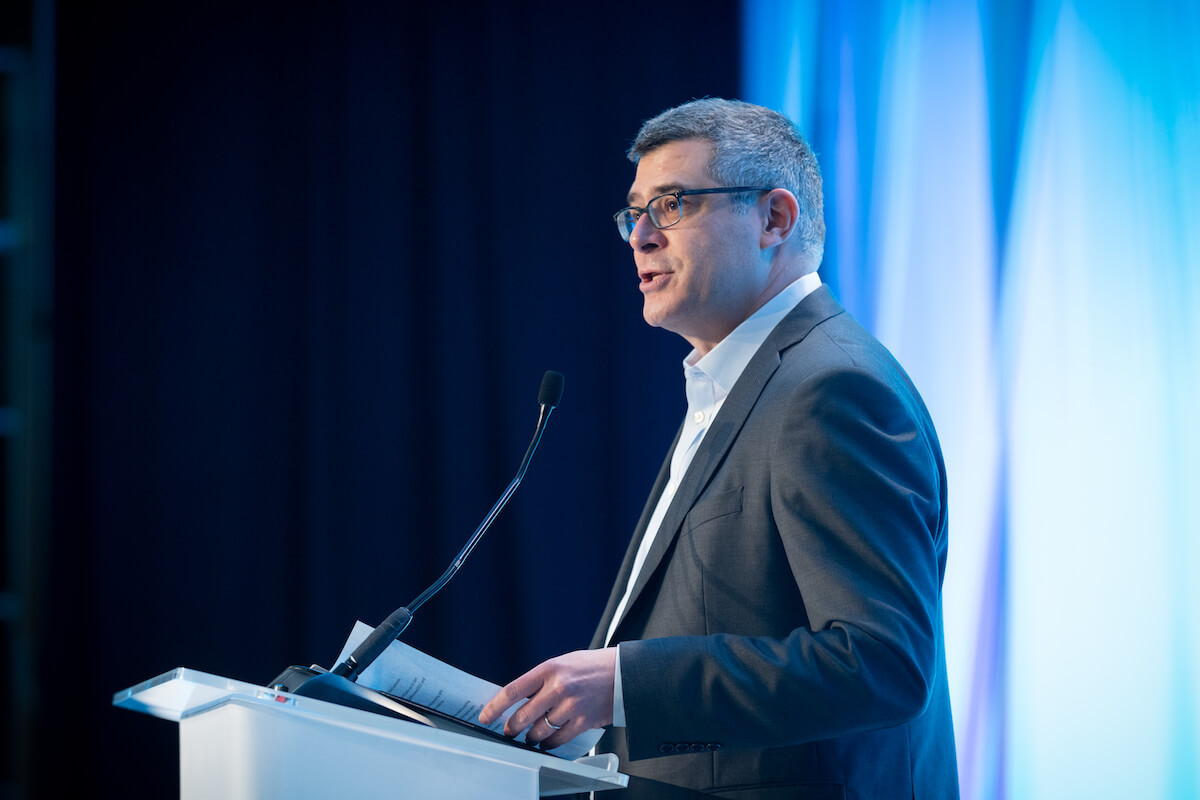Greetings, Agents of Impact!
We’re taking a brief break for the Thanksgiving holiday here in the U.S. We’ll be back in your inbox with a full Brief on Monday, Nov. 30. Stay safe and rest up.
– The ImpactAlpha team
Featured: ImpactAlpha Original
Call No. 25 recap: Gender smart investing for a sustainable recovery. The disproportionate impact of the pandemic on women is exposing an opportunity for more investors to embrace a gender lens. Of the tens of thousands of private investment funds worldwide, less than 200 strategically center women in their investment decision-making. “COVID-19 is allowing us to pursue value creation strategies such as ‘gender smart’ investing,” International Finance Corp.’s Stephanie Von Friedeburg said on ImpactAlpha’s Call No. 25 last week. “There has never been a more opportune time.” Hundreds of Agents of Impact ‘zoomed’ into The Call, where Von Friedeburg and more than a dozen guests offered up examples of how to center women across organizational structures, investment decision-making and portfolio management.
- Investment terms. “We’re applying a gender lens investing strategy at both a firm level, within the business of DPI, and also within our portfolio companies,” said Development Partners International’s Takudzwa Mutasa. With support from the global, women-focused 2X Challenge and U.K. development finance institution CDC Group, DPI hopes to set an example for other fund managers. The $1.7 billion Africa-focused private equity firm is the first designated “2X Flagship Fund,” which pegs capital from the 2X Challenge to specific gender commitments that are written into the investment terms.
- Metric sets. Firms like DPI “have a critical role to play” in promoting gender equity, said CDC Group’s Nick O’Donohoe, who joined the call to launch “A Fund Manager’s Guide to Gender-Smart Investing,” produced with the IFC, to help more fund managers develop gender lens strategies. As the development finance and the impact investment communities begin to coalesce around “a harmonized set of metrics,” he said, “it’s very important that we can articulate in a consistent and coherent way what we’re doing.”
- Business models. Pakistan-based Sarmayacar sought guidance from the IFC in framing an investment strategy that would address the lack of early-stage startup capital in Pakistan and women’s entrenched economic exclusion. The starting point: direct more capital towards the women-led businesses that exist already, said Sarmayacar’s Rabeel Warraich.
- Inclusive value chains. Trade Depot’s Onyekachi Izukanne, in Lagos, shared how the inventory finance company is investing in women’s economic inclusion by focusing on Nigeria’s informal business sector. “Three out of every four micro-retailers we serve are female-owned,” Izukanne said. “It became clear to us that to be successful, we needed to build for a largely female customer base.”
- COVID pivots. When the COVID lockdowns disrupted imports of essential foods and goods, Alitheia Capital saw an opportunity to help African businesses develop local production capacity, which would in turn fuel business growth, create jobs and make African economies less dependent on imports. The Johannesburg-based fund applied its gender lens by “intentionally bringing in women into the supply chains,” said Alitheia’s Temilade Denton. “If you do not protect, empower and strengthen women’s role” and participation in the economy, she said, “the system is overall weaker.”
- Catch up quickly. Read, “With billions as bait, development financiers seek to hook private investors on gender-lens investing,” on ImpactAlpha.
- Read the recap and watch the full playback of Call No. 25.
Editor’s note: Yesterday in The Brief we inaccurately stated that investors in CrossBoundary Energy’s off-grid solar fund made a 15X return upon exit. They exited with a 15% internal rate of return.
Dealflow: Follow the Money
ZenBusiness raises $55 million to help micro-entrepreneurs grow their businesses. The economic shock of the COVID pandemic has devastated small businesses – and driven many others to open one for the first time. Austin-based online platform ZenBusiness helps businesses with fewer than 10 people launch and scale. The company says it has doubled customer acquisition since the onset of the pandemic; roughly nine in 10 of the company’s 80,000 clients are first-time entrepreneurs. Recovery from the economic shocks of COVID-19, is “going to come down to small business formation and growth,” said Jim Breyer of Breyer Capital, a ZenBusiness investor.
- Series B. ZenBusiness’s latest round was led by Cathay Innovation. Breyer Capital also participated, along with GreatPoint Ventures and Omega Venture Partners.
- Business growth. ZenBusiness was an early investment of Steve Case’s Rise of the Rest fund. Earlier this year, it acquired fintech platform Joust, another Austin company, to expand financial services to small businesses.
- Share this post.
Factory_OS secures $55 million for better affordable housing design. The Vallejo, Calif.-based company is addressing the affordable housing crisis in the San Francisco Bay Area using digital technology to design and build safer, cheaper, and more efficient and sustainable rental properties. Google, Facebook, Morgan Stanley, Citi and Autodesk participated in the Series B round, which was led by Lafayette Square Holdings, an impact-focused investment manager. Factory_OS says it has built nearly 1,000 affordable, student and market-rate units, while cutting construction costs by 20-40%.
- New markets. Factory_OS will use the equity funding to expand to Los Angeles, invest in robotics and manufacturing facilities, and open a housing innovation center that focuses on research and education.
- Workforce development. Factory_OS, which employs 500 unionized workers, provides training programs for women and people of color in partnership with Northern California Carpenters Regional Council.
- Share this post.
Steve Case’s Revolution is raising a fourth growth fund for entrepreneurs between the coasts. Nearly 75% of all venture capital investment goes to California, New York and Massachusetts. Revolution intentionally invests in entrepreneurs outside of those geographies. The Washington, D.C.-based investment firm is targeting $500 million with its fourth fund, an SEC filing shows.
- Impact SPAC. The announcement comes as Case seeks to raise $250 million with ex-Democratic presidential candidate John Delaney for a special purpose acquisition company to invest in companies that can benefit from “the convergence of innovation, government policy and regulation (see, “Revolution Acceleration SPAC to bet on social and environmental policy shifts”).
- Black founders. Chicago-based real estate platform Adobe, Dallas-based workplace startup Kanarys, and Atlanta-based retail tech company Lillii RNB are among five finalists set to pitch at Revolution’s Rise of the Rest virtual startup pitch competition for Black founders next week.
- More.
Impact Voices: Pass the Mic
Why impact investors should double down on democracy funding. The historic voter turnout witnessed in this year’s U.S. presidential election was fueled by organizations that helped activate historically under-represented communities, effective state-based organizing, and a surge of innovation applied to the infrastructure of democracy and movement building. Also key: rapid, risk-tolerant funding to support those efforts, says Sarah Williams of Propel Capital. “To create lasting change, impact investors should think of political funding as a key component of a diversified portfolio of investing,” she writes in a guest post on ImpactAlpha.
- Democracy funding. Williams’ $5 million Propel Democracy initiative has helped seed, through philanthropic, political and investment capital, progressive efforts such as Swing Left, Indivisible, Mobilize and The Movement Cooperative, which creates shared infrastructure and purchasing power for its more than 70 nonprofit members. To counter disinformation, Propel invested in communications infrastructure such as A/B Partners, a digital storytelling studio that elevates the voices of people of color, and ACRONYM, a digital media firm.
- Seeding engagement. “Impact investors have the opportunity to replicate this outsized impact by deploying similar seed capital now for the advances of tomorrow,” says Williams. “This is a critical time to double down on funding and engagement and invest for the future.”
- Read Williams’ full post.
How to stop ‘astroturf’ campaigns and the spread of misinformation. Making projects or initiatives appear to have grassroots support while masking the true sponsors is known as ‘astroturfing’ (see John Oliver’s take). A recent New York Times expose of FTI Consulting unmasked the communications and advisory firm’s role at the center of a network of astroturfing activities designed to spread disinformation on behalf of fossil fuel interests. “As a career communications professional myself, it’s disturbing that a communications firm that claims to be ‘dedicated to helping organizations manage change, mitigate risk and resolve disputes’ would instead obscure the truth and subvert climate action,” writes Dmitriy Ioselevich of 17 Communications in a guest post on ImpactAlpha.
- Higher standards. Major environmental, social and governance organizations, including CDP and MSCI, severed ties with FTI, according to the Financial Times, signaling the reputational risk of such misinformation campaigns. Ioselevich calls for greater transparency in the sometimes-murky world of strategic communications and for higher standards that emphasize purpose and integrity over profits and misinformation.
- Read Ioselevich’s full post.
Signals: Ahead of the Curve
Short takes. Here are a few of the reports crossing our desks this week:
- Better food opportunity. Investing in more regenerative food and land-use systems can unlock $4.5 trillion in new business opportunities each year by 2030, according to the Blended Finance Taskforce. “Better Finance, Better Food” profiles more than 50 investment opportunities for investors across risk/return profiles, including AgDevCo, Aceli Africa and Working Forest Fund.
- Alternative structures for impact. From “simple agreements for future equity,” or SAFEs, to revenue-share agreements linked to social impact incentives, or SIINCs, to impact-ready matching funds, Roots of Impact’s “Innovative finance toolkit” catalogs a broad range of alternative structures for financing early-stage impact enterprises in Bangladesh (and beyond!)
- Underestimated impact. Since launching a $5 million fund five years ago to back overlooked founders, Arlan Hamilton’s Backstage Capital has invested in 119 companies in five countries, including 93 women founders, 108 founders of color and 15 LGBTQ founders. Hamilton enlisted Sherrell Dorsey’s The Plug to produce Backstage’s five-year impact report.
- Investors blast proposed ESG rule. A majority of commenters opposed the latest U.S. Department of Labor rule that would curtail proxy voting on ESG issues by retirement funds, including 96% of asset managers and 97% of investor groups, multi-employer plans and labor unions, according to an analysis of public comments by US SIF, Ceres, Impax Asset Management and Morningstar.
- Investors blast proposed ESG rule. A majority of commenters opposed the latest Department of Labor rule that would curtail proxy voting on ESG issues by retirement funds, including 96% of asset managers and 97% of investor groups, multi-employer plans and labor unions, according to an analysis of public comments by US SIF, Ceres, Impax Asset Management and Morningstar.
Agents of Impact: Follow the Talent
Spring Lane Capital and Energy and Environment Investment join the Impact Capital Managers network… The Katapult Accelerator is hiring a senior investment professional in Oslo… Octopus is seeking a fund product manager in London (see, “Impact signals for venture capitalists”).
Thank you for reading.
– Nov. 25, 2020











